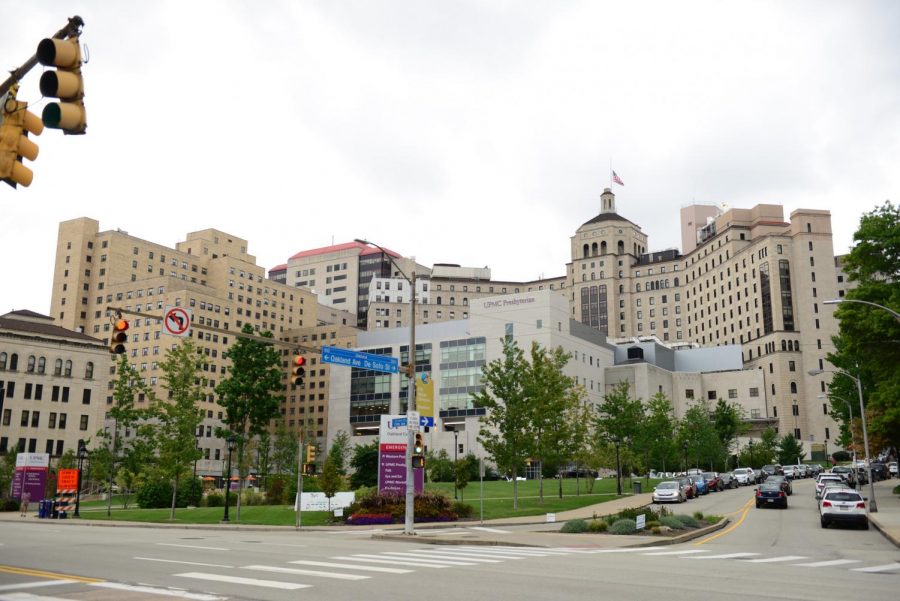Students partnering with Alzheimer Disease Research Center for research club
Wu Caiyi | Senior Staff Photographer
Pitt’s Alzheimer Disease Research Center evaluates patients with suspected Alzheimer’s disease and other forms of dementia, conducts research on the disease, and provides family education and counseling.
September 20, 2020
Receiving a diagnosis of Alzheimer’s disease can be devastating and overwhelming for a patient. But a group of Pitt students is currently working to better understand the disease.
Tommy Brower, a junior neuroscience and history and philosophy of science double major, partnered with the Alzheimer’s Disease Research Center and founded a club to train the next generation of Alzheimer’s researchers.
Alzheimer’s is a degenerative neurological disease — a form of dementia that impacts the ability to recall information and problem solve and influences behavior. Connections between brain cells begin to deteriorate, resulting in a loss of brain function over time.
Through mentoring and other programming, Pitt students can now become involved in an undergraduate research experience.
“Our vision is to create an inclusive community of passionate students engaged in concurrent research endeavors at the ADRC,” Brower said.
The students will meet to hear presentations from researchers on the forefront of Alzheimer’s disease research and discuss their projects and research experiences with them. Brower said the club hopes to match an underclassman to a more experienced student researcher and aims to create an environment comfortable for learning.
“This means having a more intentional approach to mentoring, clearer expectations from both students and researchers alike, and a community space and sentiment where students can freely discuss their experiences and ask each other questions,” Brower said.
The student research coalition consists of a small community of scholars from different majors and years all passionate about Alzheimer’s research and looking to gain more knowledge and experience of the field, Brower said.
“We emphasize students to consider joining our research early,” Brower said. “Not hesitating in trying this new experience will allow for earlier training and an earlier opportunity to work on a research project.”
While the club’s founders are still drafting their constitution to become an official University student organization and are still working on a name, undergraduate involvement with Alzheimer’s research on campus is ongoing.
Brower said students can collectively discuss ongoing research at ADRC, examine publications related to dementia disorders and participate in an open discussion forum at club meetings.
Among the nation’s top research centers in diagnosis of Alzheimer’s disease and related disorders, ADRC utilizes outpatient evaluations to enhance scientific study of Alzheimer’s research.
While there is currently no cure for Alzheimer’s, treatment can be prescribed for symptoms, and research for Alzheimer’s has rapidly expanded in the past decades.
Currently, the ADRC focuses on neuropsychiatry, neurophysiology, molecular genetics, epidemiology, neuroscience, and functional and structural imaging to dive deeper into the diagnosis and treatment of Alzheimer’s disease. The center also provides education and counseling for patients and their families and referrals to patient care and support groups.
Brower said the club wants to ensure that students’ voices will be heard in research.
“What sets us apart from other research groups is our dedication to being a student-centered and student-driven organization,” Brower said.
Dr. Howard Aizenstein is a geriatric psychiatrist and computer scientist at the Center whose research uses neuroimaging and computational approaches to enhance understanding of mental health in older adults. His goal in working with the ADRC is to better understand the disease, prevent it and treat it.
“There is both basic research aimed at understanding the disease and treatment studies aimed at testing different interventions,” Aizenstein said. “The Alzheimer’s Disease Research Center has many studies looking at mechanisms and treatments. The research education component of the ADRC is working to help connect researchers and trainees at the University.”
Kyrstin Marx, a junior rehabilitation sciences major and business manager for the developing club, aids in research as well.
“We focus on helping to better understand Alzheimer’s disease, to raise awareness for the prevention and to serve as advocates for those with the disease,” Marx said.
Brower said this is an important issue and encouraged students to get involved.
“Pittsburgh is blessed to have one of the oldest and best-funded ADRCs which is wholeheartedly throwing its weight behind this initiative and is looking to work with undergraduates,” Brower said.








